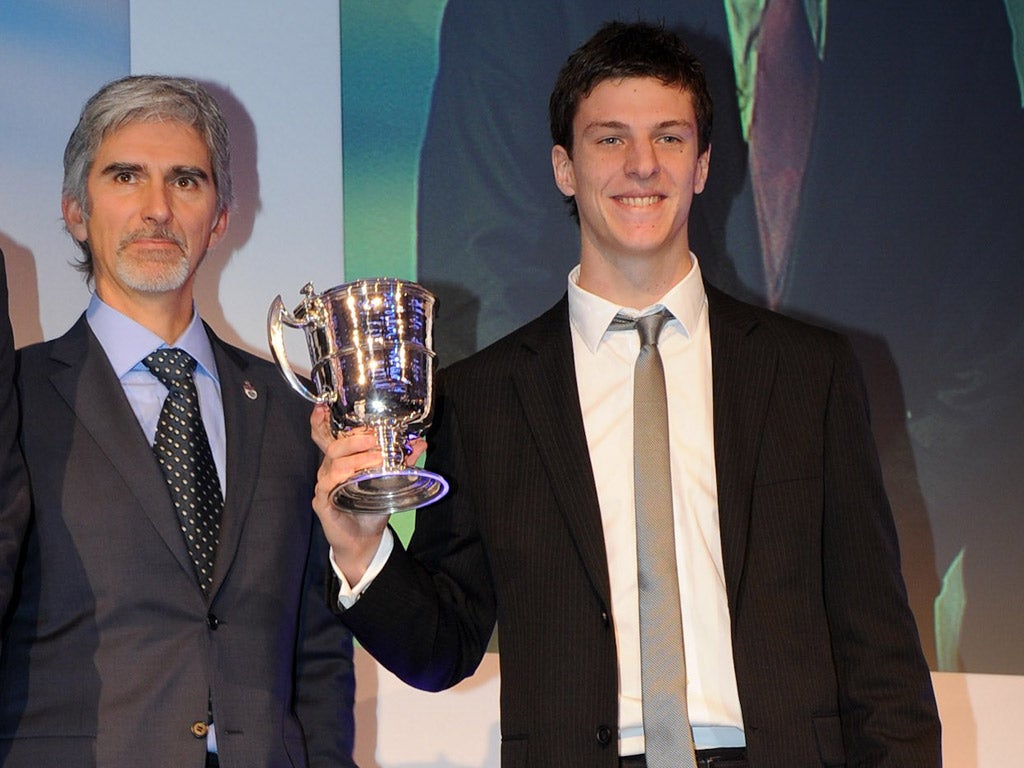Calado has the formula for success
Briton is modest but Silverstone will prove his worth

Your support helps us to tell the story
From reproductive rights to climate change to Big Tech, The Independent is on the ground when the story is developing. Whether it's investigating the financials of Elon Musk's pro-Trump PAC or producing our latest documentary, 'The A Word', which shines a light on the American women fighting for reproductive rights, we know how important it is to parse out the facts from the messaging.
At such a critical moment in US history, we need reporters on the ground. Your donation allows us to keep sending journalists to speak to both sides of the story.
The Independent is trusted by Americans across the entire political spectrum. And unlike many other quality news outlets, we choose not to lock Americans out of our reporting and analysis with paywalls. We believe quality journalism should be available to everyone, paid for by those who can afford it.
Your support makes all the difference.The cut and thrust was almost too excruciatingly close to watch, yet the lead driver, while always scrupulous in his tactics and choice of racing line, was hard enough to resist the insistent attack of his challenger.
This was not Lewis Hamilton going wheel to wheel with Romain Grosjean and Kimi Raikkonen in the Grand Prix of Europe in Valencia on 24 June. This was James Calado, the next British driver who will make it to Formula One, demonstrating earlier that day the same racer's edge, while defending his lead in a race.
Deprived of victory the previous day by the intervention of a safety car – as well as his Lotus team's slow reaction to it – was determined to win the Sunday sprint. In the end, circumstance and tyres that were older than his rivals' forced him to accept second place, but the 23-year-old from Oxford is already a winner in the series which is one step away from F1. He graduated in Abu Dhabi last year, winning his second race in the formula with the confidence of a future star.
Calado earned his spurs by keeping his head despite serious pressure from an experienced racer, the Swede Marcus Ericsson. He could have been forgiven for overdriving and slipping up. He did not.
"I didn't make any mistakes," he reflects, before this weekend's brace of GP2 races at Silverstone which support the British GP and could just trigger Caladomania. "I have less pressure when I'm at the front. I think of it all as a procedure I've learned in testing – don't look in my mirrors, just concentrate on looking after my tyres, not making mistakes. One mistake and the tyre temperatures go up 25 degrees and then never cool down again. I was reasonably calm and had it all under control. I had plenty left in the bag as well, and just stayed focused."
There is something of Hamilton's calm assurance about Calado, and it is as much a product of the mentorship from the Racing Steps Foundation which funds his racing as it is the reason why it chose to support him in his Formula Renault days. He is intelligent, takes good advice on board and seems remarkably without the dogmatic mindset that can be a by-product of the ego that any successful racing driver must have. He is open to fresh ideas and input.
At the Malaysian Grand Prix in March, Calado won again, starting from pole and controlling the race to finish ahead of his much-fancied Mexican team-mate at Lotus, Esteban Gutierrez, and Brazil's coming man, Felipe Nasr. He was set fair in Monaco until another driver's rashness put an end to a streak of 56 finishes. When you consider that Calado has raced in Formula Three, GP3 and GP2, testosterone-fuelled junior competitions all, that run is nothing short of amazing.
So does he feel pressure to become the next Briton in F1?
"No, no, no! I'm not thinking of stuff like that," he says, more calmly than it reads. "I don't think of anything other than just trying to do my job properly. Taking each race step by step. I just want to improve all the time and do my thing, forget about everyone else. I've just got to try and do my best this year, that's all."
But the momentum is undoubtedly building. Calado is a proven winner, and he is only going to get better.
A 22-year-old fabricator from Dundee will also be at Silverstone this weekend, if in less happy circumstances. A year ago, Lewis Williamson – the winner of the 2010 McLaren Autosport BRDC award and described as the best driver that the Marussia driver manager Marc Hynes had seen since Paul di Resta – beat Calado to win in GP3 after a brilliant drive. It attracted the notice of the Red Bull young driver manager, Helmut Marko, the man behind Sebastian Vettel. Marko signed Williamson to race for the new Arden Caterham team in World Series by Renault, a similar category to GP2.
Last week, after only five races, Marko sacked him. The unsentimental Austrian, a contemporary of the hard-charging Jochen Rindt, who became the sport's only posthumous champion in 1970, has a number of discarded drivers behind him. Among them are Tonio Liuzzi, Scott Speed, Jaime Alguersuari, Sébastien Buemi and Brendon Hartley, hard chargers who didn't have the instant success – and fortune – that Vettel did as he climbed the greasy pole.
As one British hope is on an upward swing the other, his equal in talent, is currently becalmed.
"It is a brutally competitive business," said Marko, ignoring the fact that it was his decision to place the rookie Williamson in a brand-new team who have struggled to understand their cars and omitting to add that the business can also be grossly unjust.
Join our commenting forum
Join thought-provoking conversations, follow other Independent readers and see their replies
Comments